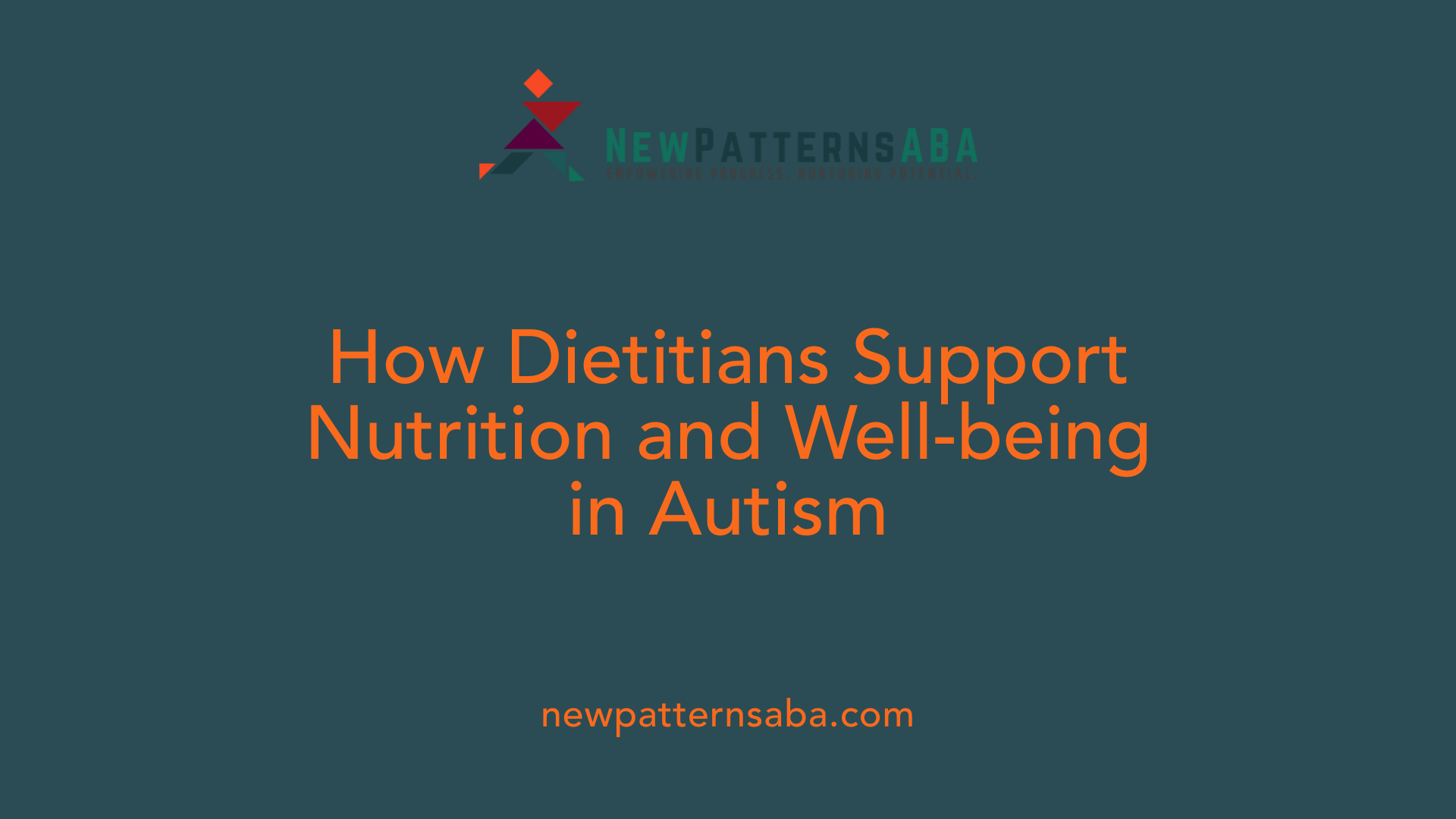Understanding the Vital Contribution of Dietitians in Autism Support
Dietitians play a crucial role in supporting individuals with autism spectrum disorder (ASD) by developing tailored nutritional strategies that address unique sensory, behavioral, and health challenges. Their involvement extends beyond basic dietary advice, forming a core component of multidisciplinary autism support programs aimed at improving overall health, managing gastrointestinal issues, and promoting positive mealtime behaviors.
The Critical Role of Dietitians in Autism Support

What is the role of a dietitian in supporting individuals with autism?
A dietitian is an essential healthcare professional who provides specialized guidance and support for autistic individuals concerning their nutritional needs. They create personalized nutrition plans that take into account each person’s sensory sensitivities, food aversions, and potential nutritional gaps. These plans are designed to promote balanced diets and improve overall health.
Dietitians work closely with other specialists, such as speech and occupational therapists, to support feeding therapy. They employ methods like food chaining, gradual exposure, and sensory integration techniques to address feeding difficulties and expand food acceptance.
These professionals also assess gastrointestinal problems common among autistic individuals, such as constipation or food sensitivities. They recommend dietary modifications to manage these issues, ensuring nutritional adequacy without causing nutritional deficiencies.
Creating supportive mealtime environments is another vital aspect of their work. Dietitians suggest strategies to reduce stress during meals, encourage positive behaviors, and support families in accepting selective eating without pressure.
Monitoring nutritional progress is an ongoing process. They adjust interventions as needed, based on health changes, growth, and preferences, to ensure maintenance of optimal nutrition. Their expert guidance helps improve physical health, cognitive functioning, and emotional well-being.
In summary, registered dietitians play a critical role in addressing dietary challenges associated with autism, ensuring individuals receive the nutrients needed to thrive—helping them lead healthier, more comfortable lives.
Nutritional Interventions and Support Strategies
 Dietitians play an essential role in supporting autistic individuals through tailored dietary plans and nutritional guidance. They evaluate each person’s unique needs, considering sensory sensitivities, food preferences, and health concerns to develop personalized strategies.
Dietitians play an essential role in supporting autistic individuals through tailored dietary plans and nutritional guidance. They evaluate each person’s unique needs, considering sensory sensitivities, food preferences, and health concerns to develop personalized strategies.
One common approach involves designing specialized diets such as gluten-free, casein-free, or elimination diets. These plans aim to identify and reduce food sensitivities while ensuring nutritional adequacy. For example, the gluten-free, casein-free (GFCF) diet eliminates gluten and dairy to potentially lessen gastrointestinal issues and behavioral challenges, though it requires careful supervision to prevent nutrient deficiencies.
In addition to dietary modifications, dietitians recommend supplements like omega-3 fatty acids, probiotics, and essential vitamins. Omega-3s, found in fish and flaxseeds, may support brain health and attention, while probiotics can enhance gut microbiome diversity, which is linked to improved behaviors and digestion.
Continuous monitoring is vital. Dietitians track individual responses to dietary protocols through regular assessments, including physical growth, nutrient levels via blood tests, and behavioral changes. Adjustments are made as needed to optimize health outcomes.
Families and caregivers also benefit from education on making safe, nutrient-dense food choices. Dietitians advise on incorporating a variety of fruits, vegetables, whole grains, and lean proteins, emphasizing the importance of nutrient-rich meals and snacks.
Addressing food selectivity and sensory sensitivities is crucial in autism support. Gradual food introduction, food chaining, and sensory desensitization techniques help expand food acceptance. Creating a positive, stress-free mealtime environment encourages better eating habits and reduces anxiety.
Through a combination of personalized dietary plans, supplementation, and education, dietitians contribute significantly to managing eating challenges and improving nutritional status. This holistic approach supports overall well-being and may even help alleviate some autism-related symptoms.
For further understanding, searching "autism nutritional interventions" offers extensive resources on various evidence-based dietary strategies and their effectiveness.
Addressing Nutritional Challenges and Deficiencies

What services and strategies do dietitians employ to manage nutritional challenges in autistic individuals?
Registered dietitians play a vital role in supporting the nutritional health of autistic individuals. They begin with comprehensive assessments of dietary habits, growth patterns, and physical health, often including lab tests to identify deficiencies. This detailed evaluation helps them develop tailored meal plans that respect sensory sensitivities and food preferences, such as preferences for certain textures, smells, or colors.
To address common nutritional gaps, dietitians focus on nutrients like calcium, zinc, iron, vitamin D, and omega-3 fatty acids. They may recommend specific foods, supplements, or dietary adjustments to ensure adequate intake. For example, they might suggest incorporating fatty fish, nuts, and seeds for omega-3s or fortified foods and supplements when dietary sources are limited.
Promoting dietary variety and balanced nutrition is a key strategy. Dietitians often introduce gradual food exposure techniques such as food chaining, visual aids, or sensory desensitization to expand food acceptance. They support families in creating predictable, stress-free mealtime routines that foster positive eating experiences.
Regular growth monitoring and ongoing nutritional assessments are fundamental to these strategies. Routine evaluations help detect emerging deficiencies early and guide modifications in the dietary plan. Collaborative care involving caregivers, pediatricians, speech therapists, and occupational therapists ensures a holistic approach to meet the individual’s needs.
By combining personalized dietary plans, behavioral techniques, and regular health checks, dietitians effectively manage nutritional challenges and help improve the overall health and quality of life for autistic individuals.
The Significance of Nutrition in Autism Support
Why is nutrition and dietary management important in autism support?
Nutrition plays a vital role in supporting individuals with autism spectrum disorder (ASD). Many autistic children face challenges such as food aversions, sensitivities, and gastrointestinal (GI) issues, which can impair their overall growth and development. Proper nutrition ensures that essential nutrients like calcium, vitamin D, zinc, and omega-3 fatty acids are adequately consumed, helping to support bone health, brain function, and immune health.
Effective dietary management also addresses common feeding difficulties, including restrictive eating patterns and sensory sensitivities to textures, smells, or colors of food. When managed well, these strategies can reduce GI discomfort and improve nutrient absorption, contributing to better physical health.
Moreover, diet has a significant impact on behavioral regulation. For instance, avoiding certain trigger foods or ensuring balanced blood sugar levels can help reduce tantrums or hyperactivity. Personalized plans created by registered dietitians help meet nutritional needs while respecting sensory preferences, promoting acceptance of a broader variety of foods.
Supporting gut health is another important aspect, as research suggests a link between the gut microbiome—affected by diet—and behaviors or mood in autism. Dietary interventions targeting gut health, such as probiotic or fiber-rich foods, can potentially modify the gut-brain axis to improve behavior and social interaction.
Beyond individual food choices, good nutrition supports metabolic functions and immune system resilience, reducing the risk of deficiencies and related health issues. Overall, comprehensive dietary management tailored to each person’s needs can enhance physical health, cognitive development, and emotional well-being, making it a cornerstone of holistic autism support.
Common Health Issues Managed by Dietitians in Autism
Dietitians are vital in helping manage several health challenges commonly experienced by individuals with autism. One of their primary roles involves addressing gastrointestinal problems such as constipation, diarrhea, and reflux. These issues are frequent among autistic individuals and can significantly affect comfort, nutrition absorption, and overall health.
Another critical area is tackling nutritional deficiencies often caused by selective eating and sensory sensitivities. Many children with autism limit their diets to specific textures, colors, or smells, risking deficiencies in vital nutrients such as iron, zinc, omega-3s, fiber, and vitamin D. Dietitians assess dietary intake thoroughly, recommend appropriate supplements, and develop strategies to ensure balanced nutrition.
Food allergies, intolerances, and sensitivities are also commonly managed by dietitians. They guide families through identification and safe elimination of problematic foods, such as gluten and dairy, and help prevent over-restriction that could lead to nutrient gaps.
Feeding difficulties, including oral motor deficits and behavioral eating challenges, are addressed through tailored interventions. Dietitians design approaches like sensory desensitization, food chaining, and routine modifications to promote acceptance of a broader range of foods.
Collaboration with other healthcare professionals is essential for comprehensive care. Dietitians work alongside speech therapists, occupational therapists, and pediatricians to support oral motor skills development and sensory processing improvements.
Ultimately, their expertise helps optimize health, support growth, improve gastrointestinal function, and promote positive mealtime behaviors, contributing to better quality of life for individuals with autism.
Finding and Collaborating with Autism-Informed Dietitians
Locating a registered dietitian (RD) with experience in autism nutrition is an important step for families seeking specialized dietary support. Parents and caregivers can start by consulting their healthcare providers for referrals to qualified professionals. Additionally, professional directories such as those maintained by the Academy of Nutrition and Dietetics can help find certified dietitians with autism experience.
Expanding access through telehealth services makes it easier to work with specialists who understand autism-specific eating challenges. Virtual consultations are particularly helpful for families in remote areas or those who prefer flexible scheduling.
When choosing an RD, it’s beneficial to ask about their experience with autism, sensory sensitivities, gastrointestinal issues, and behavioral challenges related to eating. Clarifying their familiarity with interventions like food chaining, sensory modification, and managing restrictive diets ensures the support received is well-informed.
Working with an autism-informed dietitian offers multiple benefits. They can develop personalized nutrition plans that respect sensory preferences, address nutritional gaps, navigate food allergies or intolerances, and support healthy mealtime routines. Collaboration with such professionals can improve dietary variety, minimize nutritional deficiencies like iron or vitamin D gaps, and promote positive attitudes toward food.
Integrating dietitian guidance into a broader autism care plan involves teamwork with speech therapists, occupational therapists, pediatricians, and behavioral specialists. This holistic approach helps create a supportive environment for eating and mealtime, reduces stress, and fosters a positive relationship with food.
In summary, finding a knowledgeable, autism-aware dietitian and maintaining open communication ensures tailored, effective support that enhances nutrition, health, and overall wellbeing.
Supporting Autism Through a Holistic Nutritional Approach
Incorporating the expertise of trained dietitians into autism support programs offers vital benefits, including addressing dietary challenges, promoting gastrointestinal health, and improving mealtime behaviors. Their holistic approach, which emphasizes individualized plans, family involvement, and multidisciplinary collaboration, enhances overall health, reduces nutritional gaps, and supports development. Recognizing the critical contribution of dietitians can significantly improve the quality of life for autistic individuals and their families. Encouraging access to specialized nutrition support is an essential step toward comprehensive autism care.
References
- Autistic adults and nutrition: When and how to find a ... - Autism Speaks
- How Dietitians Support Sensory Needs and Nutrition in Kids on the ...
- [PDF] Registered Dietitians: What to Expect - Autism Ontario
- Autism Dietitian Nutritionist, Medical Nutrition Therapy in Colorado ...
- Nutrition and Autism - Access Your Supports
- Dietitians for people with autism | The Spectrum
- Nutrition and Feeding Therapy for Children on the Autism Spectrum





